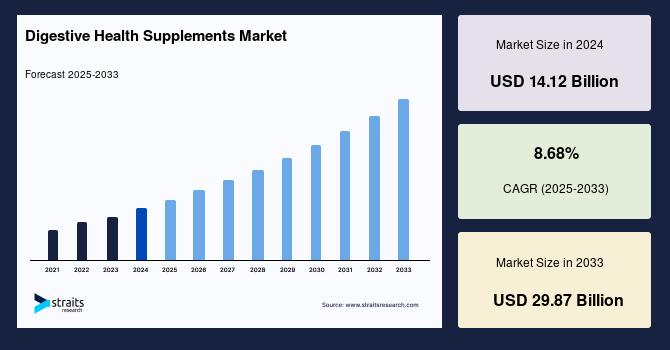Digestive Health Supplements Market: Growth, Trends, and Future Outlook

The global digestive health supplements market size was valued at USD 14.12 Billion in 2024 and is projected to grow from USD 15.35 Billion in 2025 to USD 29.87 Billion by 2033, exhibiting a CAGR of 8.68% during the forecast period (2025-2033).
Understanding Digestive Health Supplements
Digestive health supplements are nutritional products consumed alongside regular diets to aid the digestive process by assisting in the breakdown of carbohydrates, proteins, and fats. They include product types such as probiotics, prebiotics, digestive enzymes, and other specialty supplements. Their benefits extend beyond digestion improvement to immune system enhancement and support for women’s health. These supplements promote a balanced gut microbiome, facilitating better nutrient absorption and reducing gastrointestinal discomforts such as bloating, constipation, and irritable bowel syndrome (IBS).
Market Drivers and Consumer Trends
Several key factors are propelling market growth. Increasing consumption of processed and high-sodium foods worldwide has contributed to a rise in digestive disorders and lifestyle diseases like obesity, fueling consumer interest in supplements that promote gut health. Concurrently, a surge in health consciousness and digital health tracking technologies empowers consumers to make informed dietary choices, driving adoption of digestive health supplements.
Probiotics, which help cultivate beneficial bacteria in the gut, are among the fastest-growing segments within the market. Their affordable pricing and extended shelf life encourage widespread consumer usage. New delivery formats such as liquids, syrups, gummies, and powders are gaining traction, catering to preferences for convenience and diverse consumption methods. Liquids currently hold the largest market share due to their perceived effectiveness and ease of use.
E-commerce and omnichannel retail strategies also significantly enhance product accessibility, with online sales channels expected to grow robustly in coming years alongside traditional stores.
Regional Market Insights
North America dominates the global digestive health supplements market due to high consumer awareness, established healthcare infrastructure, and prevalent lifestyle-related digestive issues. The region’s demand is driven by increasing obesity rates and a preference for supplements that can reduce healthcare costs. Europe follows closely, with consumers embracing clean-label, plant-based, and scientifically validated supplements.
The Asia-Pacific region is anticipated to witness the fastest growth rate. Rapid urbanization, changing dietary habits, increasing disposable incomes, and traditional medicine integration like Ayurveda and Traditional Chinese Medicine contribute to this growth. Countries like India, China, Japan, and Australia are key markets benefiting from expanding consumer bases focused on digestive wellbeing. Public health campaigns and increasing penetration of e-commerce further accelerate growth.
Challenges and Market Restraints
Despite promising growth, the market faces regulatory challenges. Stringent rules governing safety claims and product approvals can delay the introduction of new supplements. Compliance with laws such as the Dietary Supplement Health and Education Act (DSHEA) and Food and Drug Administration (FDA) registration requirements adds complexity for manufacturers. Additionally, rising manufacturing and raw material costs, along with taxes, can impose financial constraints on industry players.
Competition and Innovation
The competitive landscape comprises prominent companies focusing on product innovation, clean-label formulations, and personalized nutrition to capture market share. Innovations such as microencapsulation, time-release capsules, and allergen-free or vegan formulations are gaining prominence to address specific health needs and consumer preferences.
Emerging trends include integration of gut health testing and DNA-based personalized supplement plans, aligning products with individual microbiome profiles. This bespoke approach is expected to redefine consumer engagement and loyalty in digestive health.
Market Segmentation
The market can be segmented by product type into:
-
Probiotics: containing live beneficial bacteria
-
Prebiotics: non-digestible fibers that nourish good bacteria
-
Enzymes: aiding the breakdown of food components
-
Other products: including botanicals and specialty blends
By form, products include:
-
Liquids and syrups
-
Capsules and softgels
-
Tablets
-
Gummies and chewables
-
Powders
Sales channels encompass:
-
Modern trade (supermarkets, hypermarkets)
-
Specialty and health stores
-
Online retailing
-
Convenience stores
-
Multi-brand outlets
Future Outlook
As global consumers increasingly prioritize digestive wellness for overall health, the digestive health supplements market is expected to sustain strong growth through 2033. Expanding product portfolios with innovative delivery technologies, increased regulatory clarity, and rising consumer trust in natural and functional supplements will support market penetration. The synergy of traditional health knowledge and modern nutritional science will open new avenues for product development and geographic expansion, particularly in emerging economies.
In summary, the digestive health supplements market represents a dynamic and fast-growing sector of the global wellness industry, driven by evolving consumer health priorities, technological advances, and expanding market access, promising sustained growth well into the next decade.
- Art
- Causes
- Crafts
- Dance
- Drinks
- Film
- Fitness
- Food
- الألعاب
- Gardening
- Health
- الرئيسية
- Literature
- Music
- Networking
- أخرى
- Party
- Religion
- Shopping
- Sports
- Theater
- Wellness



